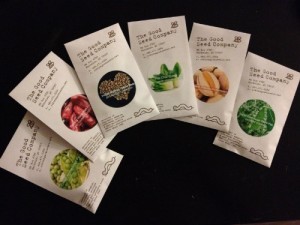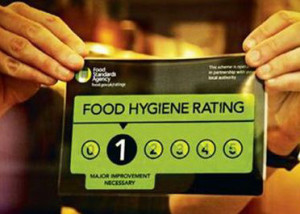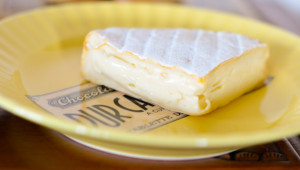My latest from Texas A&M’s Center for Food Safety. Check them out on the Intertubes at http://cfs.tamu.edu/.
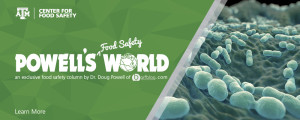 My second grandson will be born about the time this is published and, with five daughters, I’ve had my share of conversations about what moms-to-be should and should not eat.
My second grandson will be born about the time this is published and, with five daughters, I’ve had my share of conversations about what moms-to-be should and should not eat.
I learned a long time ago that preaching is futile: telling people what to do just doesn’t work.
I can cite lots of risk communication research to support this view, but I’d rather have a chat, provide information, and see where it goes.
It’s a confusing mess of informational goop out there, with a newspaper and even Toronto Sick Kids hospital saying it’s OK for pregnant women to eat “unpasteurized cheeses, shellfish and other ‘edgy foods.’”
They’re not edgy, they’re microbiologically risky because the immune system of expectant moms is ratcheted down by a factor of 10 to avoid harming the fetus. To say the rates of listeriosis is lower in France where pregnant woman eat unpasteurized cheese (and this applies to any refrigerated, ready-to-eat foods) is to ignore deficiencies in surveillance. One of the largest French cheese producers said it was switching to all-pasteurized in 2008 because it didn’t want any more bodies – born or unborn.
An outbreak of Listeria in cheese in Quebec in fall 2008 led to 38 hospitalizations, of which 13 were pregnant and gave birth prematurely. Two adults died and there were 13 perinatal deaths.
A Sept. 2008 report showed that of the 78 residents of the Canadian province of British Columbia who contracted listeriosis in the previous six years, 10 per cent were pregnant women whose infections put them at high risk of miscarriage or stillbirth.
The majority — nearly 60 per cent — of pregnant women diagnosed with listeriosis either miscarry or have stillbirths.
 A few months ago, my daughter e-mailed to ask, “So I know I can’t eat deli meat due to risk of Listeria but what about pepperettes?” (apparently they’re a Canadian thing).
A few months ago, my daughter e-mailed to ask, “So I know I can’t eat deli meat due to risk of Listeria but what about pepperettes?” (apparently they’re a Canadian thing).
I said they’ve probably been heat-treated if they’re commercially available, but copied Chapman to get another opinion.
I failed.
Dr. Ben wrote back that “most are shelf stable based on acidity and water activity (pH and Aw) — they have been fermented and dried (not cooked). “Sometimes they are smoked. Sometimes not.
“I’d cook it because you’d have to know that the pH and Aw was correct and what the steps were to validate the process.
“They are probably fine, but hard to know without the specifics.”
We all make our own risk decisions. And around pregnancy, some folks — like Chapman — choose to be super-cautious.
When our partners were pregnant, Chapman and I would have arguments about whether brie cheese made from pasteurized milk was safe because of its ability to support Listeria growth in a post-processing contamination scenario, and my wife would look at me and go, “nerd.”
She was right. And it was of no help to the pregnant ones (the toasted brie on crackers apparently did help).
What I’ve found through all these pregnancies is the enormous amount of conflicting advice provided to the moms-to-be.
It’s stressful enough being pregnant (not that I would know) without having Dr.-this-that giving bogus advice.
And from Dr. Oz to the Food Babe, the BS detector is rising in public circles.
Back in 2000, the American media was filled with coverage of lLsteria after the 1998-1999 Sara Lee Bil Mar hot dog outbreak in which 80 were sickened, 15 killed and at least 6 pregnant women had miscarriages. Risk assessments had been conducted, people were talking about warning labels, and especially, the risks to pregnant women.
About the same time, I was at a meeting and watched a pregnant PhD load up on smoked salmon, cold cuts and soft cheese for lunch and wondered, do I say something?
One of the biggest risks in pregnancy is protein deficiency. What if smoked salmon, cold cuts and soft cheeses were this woman’s biggest source of protein? (Turns out they were.)
Another big risk factor is stress. I didn’t want to freak her out. Besides, who the hell am I to say anything?
This competes with the duty of care in that, if you have knowledge of something, you have a responsibility to act.
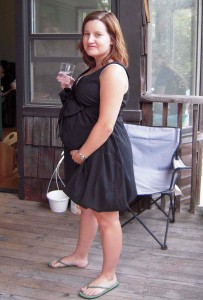 I sat with the woman during lunch and chatted about babies, her aspirations and how she was feeling. Eventually I introduced the subject of Listeria by talking about a risk assessment that had recently been published by the U.S. Food and Drug Administration, and that maybe she would be interested in looking at the results.
I sat with the woman during lunch and chatted about babies, her aspirations and how she was feeling. Eventually I introduced the subject of Listeria by talking about a risk assessment that had recently been published by the U.S. Food and Drug Administration, and that maybe she would be interested in looking at the results.
I felt sorta goofy.
And the pregnant woman? When I saw her at another meeting a couple of months later, she thanked me for providing her with information about Listeria and risky foods for pregnant mothers.
But I’m just providing information – the peer-reviewed kind. It’s that duty of care thing.
It’s more than just hope and faith I wish for my daughter and her birth. She knows her science.
Dr. Douglas Powell is a former professor of food safety who shops, cooks and ferments from his home in Brisbane, Australia.
DISCLAIMER: The views and opinions expressed in this blog are those of the original creator and do not necessarily represent that of the Texas A&M Center for Food Safety or Texas A&M University.
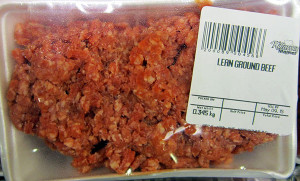 This recall was triggered by Canadian Food Inspection Agency (CFIA) test results. The CFIA is conducting a food safety investigation, which may lead to the recall of other products. If other high-risk products are recalled, the CFIA will notify the public through updated Food Recall Warnings.
This recall was triggered by Canadian Food Inspection Agency (CFIA) test results. The CFIA is conducting a food safety investigation, which may lead to the recall of other products. If other high-risk products are recalled, the CFIA will notify the public through updated Food Recall Warnings.
